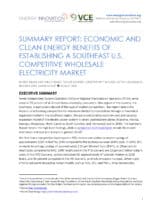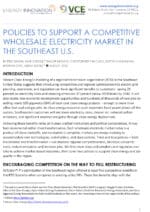This first-of-its-kind report shows how a fully competitive Southeast U.S. wholesale electricity market the would generate approximately $384 billion regional economic savings, create 285,000 clean energy jobs, and reduce electricity sector emissions 37 percent by 2040.
Summary Report: Economic and Clean Energy Benefits of Establishing a Southeast U.S. Competitive Wholesale Electricity Market
New modeling compares a simulated competitive wholesale electric market to a business-as-usual case based on the Integrated Resource Plans of Southeastern U.S. utilities. The analysis finds immediate and dramatic benefits including $384 billion in cumulative savings and 23% lower electricity rates; 131 GW of new solar, wind, and storage; 285,000 new energy sector jobs; and 37% lower emissions by 2040, all compared to business-as-usual
Data Explorer
This online data explorer allows anyone to view the economic, jobs, generation, and emissions data in a dynamic format along with specific results for each of the seven states (Alabama, Florida, Georgia, Mississippi, North Carolina, South Carolina, and Tennessee) included in the regional model.
Policies To Support A Competitive Wholesale Electricity Market In The Southeast U.S.
This companion report identifies steps policymakers and regulators can take to support clean energy across the Southeast U.S. while improving regional competitiveness, decreasing consumer costs and emissions, and adding good jobs.
Technical report: Economic and Clean Energy Benefits of Establishing a Southeast U.S. Competitive Wholesale Electricity Market
The companion technical report details the mechanics of the combined production-cost and capacity-expansion model of the electric power system in seven Southeastern states (Alabama, Florida, Georgia, Mississippi, North Carolina, South Carolina, and Tennessee) out to 2040.




